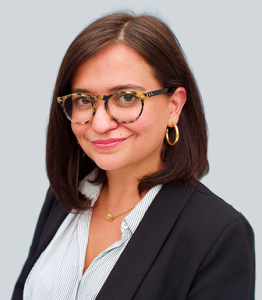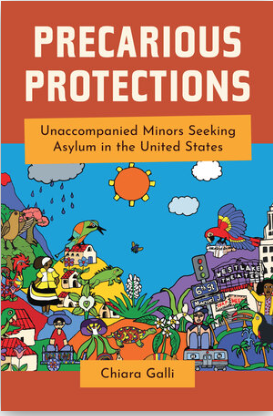Turning a keen eye toward the tension between protected migrants and exclusionary tendencies in the West
This book has been awarded the 2024 Distinguished Scholarship Award from the Pacific Sociological Association.
Chiara Galli’s forthcoming book is based on her research into the barriers faced by unaccompanied minors from Central America.
By Sarah Steimer
By combining ethnographic fieldwork, quantitative methods, and other research modes, Chiara Galli focuses her work on immigration policy and its effects, and on how children differ from adults as migratory actors and legal subjects. Her work at Los Angeles nonprofits led to a new book that explores the experience of unaccompanied minors from Central America as they seek refugee status in the U.S.
Prior to her academic career, Galli was a policy analyst for the Italian National Contact Point of the European Migration Network. She also held positions at other nonprofits. Through those roles, and interested in pursuing her own research questions, she chose to begin doctoral studies in Sociology at the University of California, Los Angeles. She earned her Ph.D. received in 2020, and held a postdoctoral fellowship at Cornell University from 2020 to 2022. She joined UChicago in 2022 as an assistant professor in the Department of Comparative Human Development.
Galli’s dissertation led her to study the tension between which individuals society seems to agree should be protected (even if they are noncitizens) and who have broadly recognized rights (for example, children feeling violence) alongside U.S. and European exclusionary tendencies to want to keep out migrants considered undesirable.
Galli’s forthcoming book, Precarious Protections: Unaccompanied Minors Seeking Asylum in the United States, with University of California Press, is an ethnography of the experiences of Central American unaccompanied minors and their immigration attorneys as they seek refugee status in the U.S. asylum process. The book is based on six years of research, spanning the Obama and Trump administrations. Her study included ethnographic fieldwork in nonprofits in Los Angeles that help children apply for immigration relief, along with more than 120 interviews with unaccompanied children, their attorneys, and other key actors.
“It was a fortuitous accident that I ended up studying this particular topic,” Galli says. “I had wanted to study the extension of DACA and reached out to a nonprofit legal clinic to do research. I told them that I was willing to volunteer — I'm fluent in Spanish, and these organizations are usually quite overworked and under-resourced. They welcomed me with this reciprocal relationship.”
“When the new DACA program was blocked by a conservative lawsuit, I stayed at this organization and focused on an issue that advocates themselves thought was important to document: children’s experience in the asylum process. I quickly noticed how little had been written about the topic despite the fact that children make up a disproportionate share of the global refugee population and increasing numbers of children are crossing international borders alone to seek asylum both in the US and worldwide.”
Galli says she hopes that Precarious Protections will draw awareness to key misconceptions that are prevalent in contemporary discourse about asylum seekers. She wanted to make the text accessible for a broader public, hoping to debunk the idea of the asylum seeker submitting bogus claims. Instead, she explains, “the way that we interpret asylum law is so narrow that it doesn’t actually apply to many experiences of escape from life-threatening violence, in particular, those reported by children and teenagers who flee Central America today.”
“We have this refugee definition that crystallized after World War II: It's a very state-centric definition designed for the male adults who were fleeing totalitarian regimes at the time,” Galli says. “The world has changed a lot since then. We are seeing more women and children fleeing forms of violence where the state is more indirectly implicated, which raise special challenges for legal advocates. The interpretation of the refugee definition has evolved to some extent to recognize other experiences of escape from violence, such as domestic violence, in ways that also benefit children. Thanks to advocacy victories, we have also introduced some special due process protections for children in the US immigration system.”
In the book, Galli argues that these protections are precarious when they are implemented in practice, and this was especially apparent in the increasingly anti-immigrant context under Trump. “As a result, unaccompanied youth are in tenuous legal statuses in the U.S.,” she says, “and they are unable to envision and plan stable futures in the country that they had hoped to call their home.”
The book’s conclusion includes policy recommendations. Galli argues that for protections for vulnerable groups to be truly meaningful, the U.S. must stop trying to evade its commitment to international refugee law and limiting access to refugee protections for all individuals. Instead of carving out exceptions from rights violations for the particularly vulnerable, she says, the U.S. should respect the human rights of all immigrants, and then protections for groups like unaccompanied children should be supplemental.
Galli is also working on two new collaborative research projects using quantitative methods. One project uses administrative data from U.S. immigration courts to examine national trends in access to legal representation and determinants of case outcomes for unaccompanied minors. The second project uses Mexican Migration Project survey data to compare determinants of Mexican child and adult migration to the U.S., asking how these have evolved historically from the 1960s until today.
A book launch for Precarious Protections, will be held at The Seminary Co-op on April 3. Galli will be joined in conversation by Angela Garcia, a sociologist and associate professor at the Crown Family School.
 THE UNIVERSITY OF CHICAGO
THE UNIVERSITY OF CHICAGO



